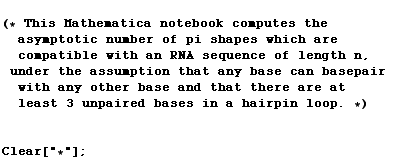

![]()
![]()
![]()

Here are the 2 possibilities for the generating function. We choose the one that does not blow up at 0.
![]()
![]()
The dominant singularity will occur where the square root evaluates to 0, or
where the denominator is 0 (z = 1, but not z = 0, actually analytic there),
whichever is closest to origin.
![]()
![]()
![]()

![]()
![]()
This gives us our dominant singularity, r.
![]()
![]()
This is our exponential growth rate.
![]()
![]()
![]()
![1 + 1.32218 z + 1.74816 z^2 + 2.31137 z^3 + 3.05605 z^4 + 2.04064 z^5 + 2.69809 z^6 - 0.432643 z^7 - 0.572031 z^8 - 0.756328 z^9 - 3.55271*10^-15 z^10 + O[z]^11](HTMLFiles/piShapesForLengthNseq_19.gif)
This is how we have figured to divide polynomials in Mathematica. Since r is only a numerical approximation, p2a is not actually a polynomial gotten by dividing out one root, but it is really close to one. By cutting and pasting the above, we can get a polynomial p2 such that p2*(1-z/r) is very close to poly. That is all we need.

![]()
![]()
![]()
(Very close to p1, so p2 is what we want.)
![]()
![]()
![]()

Remember, only the part that was next to the dominant singularity will matter.
![]()
![]()
![]()
![]()
Remember alpha=1/2 as the singularity was (1-z/r)^(1/2), and that exponent gives us alpha. We then know we have a factor of n^(-alpha-1)
So S_n ~ 2.44251*1.32218^n * n^(-3/2)
| Created by Mathematica (December 22, 2006) |